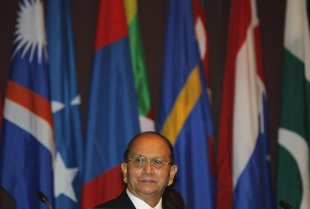
The White House announced Wednesday that President Barack Obama will welcome President Thein Sein of Myanmar next week. It's a historic visit, part of a gradual patching-up of relations after decades of tension and U.S. economic sanctions.
Obama himself became the first sitting president to visit Myanmar in November 2012. But there's one catch: According to the State Department and the CIA, there's doesn't seem to be any such country. According to those agencies, Thein Sein leads "Burma."
It's a notable diplomatic reward. Obama used the name "Myanmar" during his visit there in November. Authorities there have long quested for Washington to recognize the name, but it's still quite rare among U.S. policymakers—and nearly unheard of in Congress.
Here's the State Department's take: "The military government changed the country name to "Myanmar" in 1989. It remains U.S. policy to refer to the country as Burma."
What does the Central Intelligence Agency have to say? This: "Since 1989 the military authorities in Burma, and the current parliamentary government, have promoted the name Myanmar as a conventional name for their state; the US Government has not adopted the name, which is a derivative of the Burmese short-form name Myanma Naingngandaw."
So why the change? National Security Council spokeswoman Caitlin Hayden has the goods:
"The United States government over time has begun limited use of the name 'Myanmar' as a diplomatic courtesy," Hayden told Yahoo News by email. "Our policy remains that Burma is the name of the country."
She confirmed that the use of the other name is, in effect, a symbolic reward.
"Burma has undertaken a number of positive reforms, including releasing over 850 political prisoners; easing media restriction; permitting freedom of speech, assembly, and movement," she said. "We have responded by expanding our engagement with the government, easing a number of sanctions, and as a courtesy in appropriate setting, more frequently using the name 'Myanmar.'"
Obama believes "that showing respect for a government that is pursuing an ambitious reform agenda is an important signal of support for its efforts and our desire to help the transformation succeed," Hayden said.
Here is the full statement from White House press secretary Jay Carney:
Statement by the Press Secretary on the visit of President Thein Sein of Myanmar to the White House
President Obama will welcome His Excellency President Thein Sein to the White House on Monday, May 20, 2013. Since President Obama’s historic trip to Rangoon last November, the United States has continued to advocate for continued progress on reform by President Thein Sein’s government, in close cooperation with Aung San Suu Kyi, civil society leaders, and the international community. The President looks forward to discussing with President Thein Sein the many remaining challenges to efforts to develop democracy, address communal and ethnic tensions, and bring economic opportunity to the people of his country, and to exploring how the United States can help.
President Thein Sein’s visit underscores President Obama’s commitment to supporting and assisting those governments that make the important decision to embrace reform, and highlights the dedication of the United States to helping the Burmese people realize the full potential of their extraordinary country.